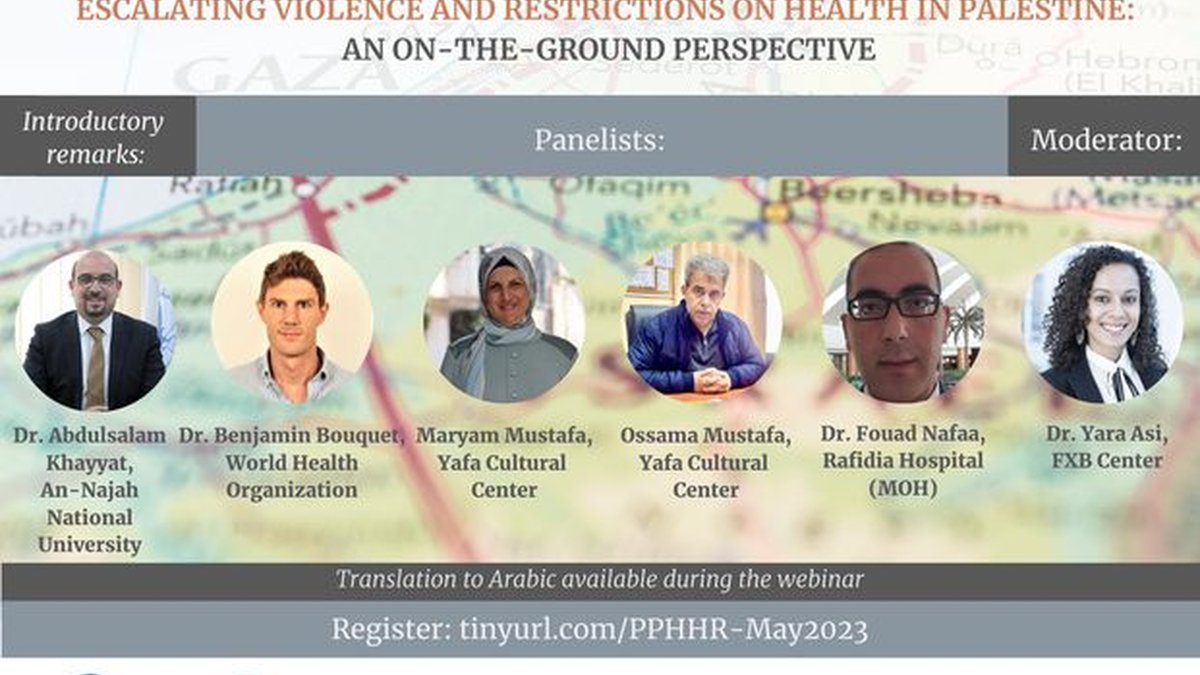
An-Najah National University, in collaboration with the FXB Center for Health and Human Rights at Harvard University, successfully hosted a groundbreaking symposium titled "Escalating Violence and Restrictions on Health in Palestine: An On-the-ground Perspective." The symposium, organized by the International and External Affairs Office and the An-Najah Global Health Institute, aimed to shed light on the critical situation faced by Palestinians in terms of health and well-being.
Under the auspices of the FXB Center for Health and Human Rights at Harvard University, the An-Najah National University Virtual Exchange Collaborative, and the An-Najah Global Health Institute, the symposium gathered prominent experts, scholars, and professionals from various fields to discuss the escalating violence and its detrimental impact on the health conditions in the occupied West Bank.
Dr. Yara Asi, Assistant Professor at the University of Central Florida in the School of Global Health Management and Informatics, extended a warm welcome to all the participants and expressed gratitude to An-Najah National University for spearheading this vital initiative during a period of heightened security tension.
Dr. Al-Asi emphasized her grave concern regarding the ongoing escalation of violence and its severe consequences on the health situation in the occupied West Bank cities. She highlighted the devastating effects of demolitions, settlements, settler attacks, and the imposed closures on the access to timely and adequate healthcare for patients.
Dr. Abdel Salam Al-Khayyat, Vice President for Academic Affairs at An-Najah National University, underscored the significance of the symposium, stating, "An-Najah National University is fully committed to leveraging its resources and capabilities in support of the educational and medical sectors in Palestine, particularly through our esteemed An-Najah University Hospital, which plays a crucial role in treating those injured by the occupation's bullets."
Al-Khayyat added, "Despite the numerous obstacles and restrictions faced by the University, we have diligently managed the situation and prioritized the health and safety of our students, faculty, and staff. We have resorted to e-learning methods and adjusted examination schedules in response to the occupation-imposed closures."
Furthermore, Al-Khayyat cautioned against the long-lasting physical and psychological impact of the oppressive measures enforced by the occupation, stressing their detrimental effects on the well-being of the Palestinian population.
Dr. Benjamin Bouquet, Technical Officer for Public Health and Human Rights with the World Health Organization in the occupied Palestinian territory, highlighted the challenging healthcare conditions faced by patients, their families, and medical personnel in the West Bank and Gaza Strip.
Bouquet stated, "The Israeli army's frequent attacks on patients and healthcare workers in Palestine have significantly exacerbated an already dire health situation."
Dr. Fouad Nafaa, Head of the Rafidia Hospital Surgical Department, elaborated on the immense pressure experienced by the health sector during recent periods of security escalation, particularly in the city of Nablus. The city has witnessed a series of incursions by the occupation army, resulting in numerous casualties and injuries.
Dr. Nafaa stated, "The health sector in Palestine is under immense strain, especially during periods of security escalation. We have dealt with numerous critical injuries, most of which are caused by occupation bullets targeting vital areas such as the head, neck, and chest."
Representatives from the Yafa Cultural Center offered a special intervention, shedding light on the challenging conditions within the health centers of Balata camp. The camp has been subjected to repeated incursions by the occupation, leading to armed confrontations in its vicinity.
عدد القراءات: 10





